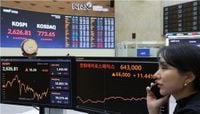In a surprising turn of events, Hanwha Aerospace's stock has faced a sharp decline following the announcement of a substantial rights offering, raising concerns among shareholders. On March 21, 2025, Hanwha Aerospace revealed its intention to conduct a rights offering valued at approximately 3.6 trillion won, the largest of its kind for a domestic firm. This announcement led to an immediate drop in the company's stock price, which traded at 627,500 won by 9:30 AM, down 13.09% from the previous closing price.
Analysts have attributed this downturn mainly to the fear of share dilution among existing shareholders as the rights offering will result in an estimated dilution rate of about 13.05%. The offering allocates 20% to Woori Sajoo, while 80% will be available for existing shareholders. The expected offering price is set at 605,000 won, or approximately a 15% discount compared to market price at announcement time.
Investor concerns have been compounded by past gains and current market conditions. Earlier this year, Hanwha Aerospace saw its stock price rise dramatically—over 121% year-to-date. Some analysts, including Han Young-soo from Samsung Securities, expressed skepticism about the necessity of this offering given the company's improving cash flow and profitability. He noted, "Much of Hanwha Aerospace’s recent gain could justify any further increases in stock value. The rights offering is likely to negatively impact investor sentiment."
Moreover, the Financial Supervisory Service has announced that it plans to conduct a close examination of the rights offering, reflecting the magnitude of the financial maneuver as well as the potential implications it might have for investors. This marks the company’s first rights offering since 1999, further adding to scrutiny.
Investors voiced their frustration in online forums, expressing feelings of betrayal and disappointment. Comments among retail investors range from, "Got hit in the back of the head" to "Loyal investors feel betrayed after this decision." Another common sentiment highlighted the perception that the company, having surged this year, should have relied on its cash reserves instead of diluting shares to fund its expansion projects.
The plan, however, aims to bolster Hanwha Aerospace’s capabilities in the rapidly growing domestic and international defense markets by establishing a number of strategic production facilities. According to the company, it intends to use the funding to construct new plants and enhance the development of unmanned aircraft engines, aiming for 70 trillion won in sales and 10 trillion won in operating profit by 2035.
The ambitious goals include capitalizing on increasing global demand in regions such as Europe, the Middle East, and Australia, where military-related investments and production partnerships are becoming more evident, especially amid geopolitical tensions.
Despite the gloomy outlook triggered by the offering, some analysts remain optimistic. Choi Kwang-shik from Daol Investment & Securities acknowledges the potential for long-term growth and affirms the need for Hanwha’s aggressive investment strategy, stating, "While the offering method might be a disappointment, the reasoning behind seeking funds is understandable in light of increasing global military projects and partnerships."
Investors will be closely watching how Hanwha navigates this challenging period and whether the company can quickly provide clarity on how the raised funds will be allocated and invested. This transparency will likely be essential to restore confidence among shareholders and other market participants moving forward.
The market response has prompted major securities firms, including DS Investment & Securities and Samsung Securities, to adjust their ratings on Hanwha Aerospace from 'Buy' to 'Hold,' reflecting the consensus that while the firm’s strategic initiatives may be sound, the execution of this rights offering has raised some red flags.
In conclusion, while Hanwha Aerospace appears committed to expanding its operational footprint and capabilities in the global defense sector, shareholders face immediate concerns regarding their investments due to the dilution and the market's reaction to the company’s sudden capital requirements. Investors will be looking for further details on operational strategies and execution timelines following the rights offering to regain confidence and stabilize stock performance.



![[초점] 'K-방산' 대표 한화에어로 '사상최대' 3.6조 유증···적절성 '논란'](https://thumbor.evrimagaci.org/ddHpYQFxwItXY6sWoT54_bPZ9LQ=/200x0/tpg%2Fsources%2F957512e8-ef7d-4487-9d69-a2d1b6691a2a.jpeg)

![[특징주]'3.6조 유상증자' 한화에어로스페이스, 14%대↓ - 아시아경제](https://thumbor.evrimagaci.org/I-nWMEAsrCin9DXmPFHVlYyPqrE=/200x0/tpg%2Fsources%2F9f8cc912-b8cf-4ba2-94c5-76d867077371.jpeg)
![[특징주] 한화에어로스페이스, 3.6조 유상증자 발표에 주가 13% 급락](https://thumbor.evrimagaci.org/lr8BejWnnfIl267SGv_lE8CPCLQ=/200x0/tpg%2Fsources%2Fbc27e0f5-ca4c-47af-af21-7e4710437ce1.jpeg)



